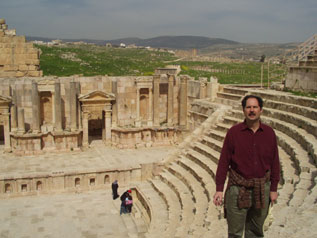 |
Laeth Nasir, M.D., at a Roman amphitheater in Jerash, in northern Jordan. |
The Fulbright Scholar Program, one of the most prestigious awards in American academia, is sponsored by the U.S. Department of State, with additional funding provided by the participating governments and host institutions. The Council for International Exchange of Scholars (CIES) is a private, nonprofit organization that manages Fulbright senior scholar exchanges. The awardees are named by J. William Fulbright Foreign Scholarship Board – a board appointed by the President of the United States.
“Family medicine is just getting started in Jordan, so there is a lot to do in terms of developing a common medical culture, training and research agenda,” said Dr. Nasir, a native of Jordan. “The Fulbright scholarship is a great honor and I am proud to represent UNMC. It’s also a wonderful opportunity to return to the Middle East on an extended basis to teach, practice and do research.”
 |
Marc Tompkins |
Since he began his Fulbright scholarship in Amman, Jordan, he has experienced a whole new world of medical issues. He has found patient education to be very important as his patients are of much poorer social status and have many more medical needs. He is treating patients with diseases not found in the United States including bilharziasis and hydatid cysts (both caused by worms) and brucellosis (bacterial infection acquired from livestock).
Vitamin B12 deficiency is rampant and depression is very common. The subject of depression is very taboo in Jordan; nevertheless Dr. Nasir is doing research on the barriers to diagnosis and treatment of depression in Jordan. He also is doing research on maternal and child health care as part of a national study sponsored by Jordan’s Ministry of Health.
In addition, Dr. Nasir said he is studying risk factors for non-use of contraceptives by Jordanian women and studying other diseases prevalent in family medicine in Jordan. He is co-authoring a handbook with a Jordanian infectious disease specialist on primary care immunizations; co-authoring an article on family medicine in Jordan for WONCA, known also as the World Organization of Family Doctors; seeing patients at the university’s Family Medicine Center; and teaching residents and students.
Dr. Nasir graduated from high school in Amman, Jordan, in 1977 and returned to obtain his medical degree in 1987, after earning his bachelor’s of science degree in biology and psychology in 1981 at Western Michigan University in Kalamazoo, Mich. He did a medical internship at Jordan University Hospital in Amman from 1987 to 1988 and then his residency at UNMC from 1989 to 1992. He joined UNMC’s faculty in 1993.
“It’s very interesting to be back in the Middle East, especially because of the completely different challenges that I face here,” Dr. Nasir said. “But the food and warmer climate are a plus.”
Dr. Nasir said he has been able to offer some logistical support to a UNMC-sponsored project to development a nursing program in Iraq, as well as arranged for a month-long clinical rotation in family and internal medicine in Amman for Marc Tompkins.
Tompkins will receive his medical degree in May and hopes to eventually make a career of international health service. Having previously visited Egypt and Israel, he wanted to return to the Middle East to study medicine. He also has served on UNMC-sponsored student medical missions to Jamaica and Nicaragua and continues to pursue every opportunity available to increase his exposure to medicine in international settings. Tompkins said Dr. Nasir began encouraging him to pursue the Jordan rotation last spring and assisted his efforts every step of the way.